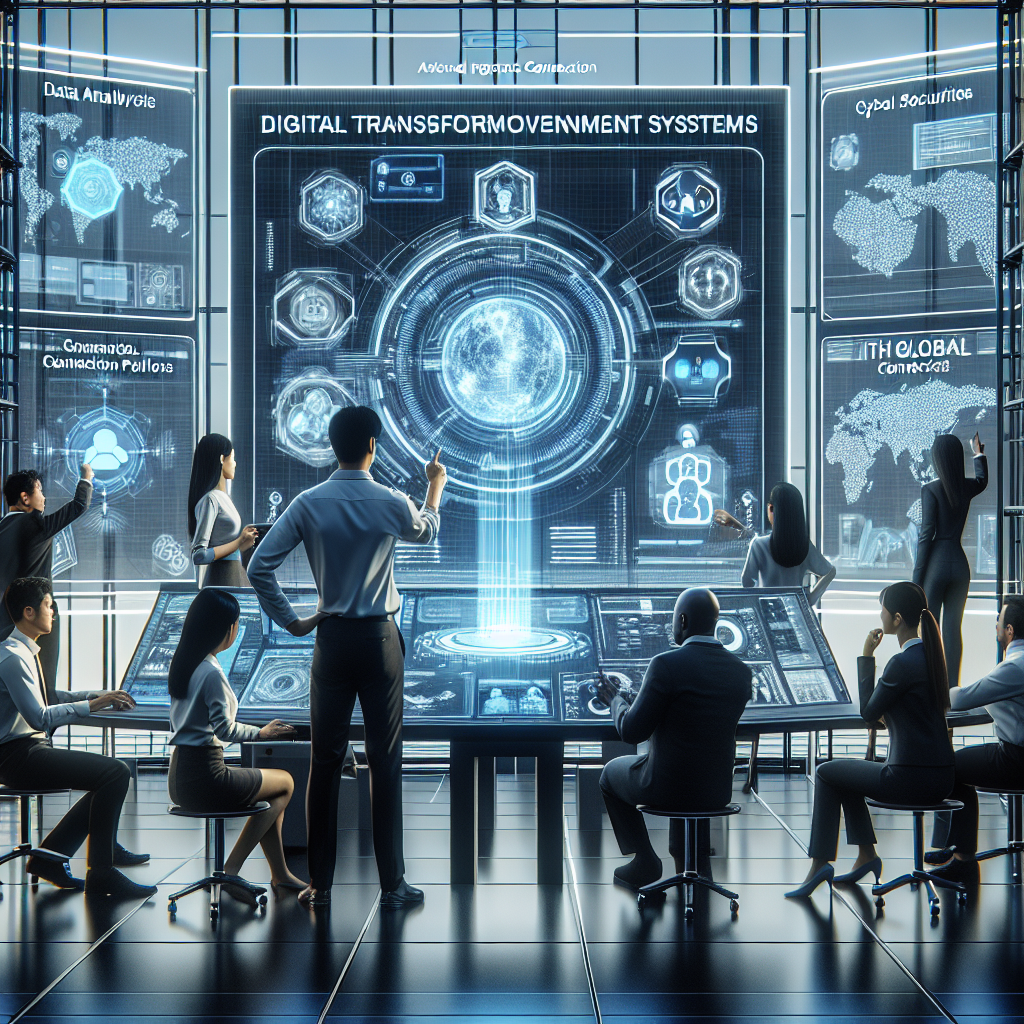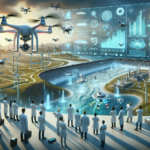-
Table of Contents
“Empowering Governance Through Digital Innovation”
Introduction

The future of digital transformation in government is poised to revolutionize public sector operations, enhancing efficiency, transparency, and citizen engagement. As governments worldwide grapple with the challenges of the digital age, they are increasingly adopting advanced technologies such as artificial intelligence, blockchain, and cloud computing to streamline processes and deliver services more effectively. This transformation promises to break down silos, foster inter-agency collaboration, and create more responsive and adaptive governance structures. By leveraging data analytics and digital platforms, governments can better anticipate and meet the needs of their citizens, ensuring more inclusive and participatory decision-making. As we look ahead, the integration of digital tools in government operations will not only drive innovation but also build trust and resilience in public institutions, paving the way for a more connected and empowered society.
Leveraging Artificial Intelligence for Enhanced Public Services
The future of digital transformation in government is poised to be significantly shaped by the integration of artificial intelligence (AI), promising to revolutionize public services in ways previously unimaginable. As governments worldwide grapple with the challenges of modernizing their operations, AI emerges as a powerful tool to enhance efficiency, improve service delivery, and foster greater citizen engagement.
One of the most compelling aspects of AI in government is its potential to streamline administrative processes. For instance, AI-powered chatbots and virtual assistants can handle routine inquiries, freeing up human resources for more complex tasks. This not only reduces wait times for citizens seeking information but also allows government employees to focus on higher-value activities. Moreover, AI can analyze vast amounts of data to identify patterns and trends, enabling more informed decision-making. This capability is particularly valuable in areas such as public health, where timely insights can lead to more effective interventions and policies.
Transitioning to another significant benefit, AI can also enhance the accuracy and efficiency of public services. In the realm of social services, for example, AI algorithms can be used to assess eligibility for benefits more quickly and accurately than traditional methods. This ensures that assistance reaches those in need without unnecessary delays. Additionally, AI can help detect and prevent fraud by analyzing data for unusual patterns that may indicate fraudulent activity. This not only protects public funds but also builds trust in government systems.
Furthermore, AI has the potential to transform the way governments interact with their citizens. By leveraging AI-driven analytics, governments can gain a deeper understanding of citizen needs and preferences. This can lead to more personalized and responsive services, enhancing the overall citizen experience. For example, AI can be used to tailor communication strategies, ensuring that information is delivered in the most effective manner for different segments of the population. This level of customization can foster a stronger connection between citizens and their government, promoting greater civic engagement.
However, the integration of AI in government is not without its challenges. One of the primary concerns is the issue of data privacy and security. Governments must ensure that the data used by AI systems is protected against breaches and misuse. This requires robust cybersecurity measures and clear policies on data governance. Additionally, there is the challenge of ensuring that AI systems are transparent and accountable. Citizens need to trust that AI-driven decisions are fair and unbiased, which necessitates the development of ethical guidelines and oversight mechanisms.
Moreover, the successful implementation of AI in government requires a skilled workforce capable of managing and maintaining these advanced systems. This underscores the importance of investing in education and training programs to equip public sector employees with the necessary skills. Collaboration with the private sector and academia can also play a crucial role in fostering innovation and sharing best practices.
In conclusion, the future of digital transformation in government, driven by AI, holds immense promise for enhancing public services. By streamlining processes, improving accuracy, and fostering better citizen engagement, AI can help governments operate more efficiently and effectively. However, realizing this potential requires addressing challenges related to data privacy, transparency, and workforce readiness. As governments navigate this complex landscape, the key will be to balance innovation with responsibility, ensuring that AI serves the public good while maintaining the trust and confidence of citizens.
The Role of Blockchain in Government Transparency and Security
As governments around the world continue to embrace digital transformation, the role of blockchain technology in enhancing transparency and security has become increasingly significant. Blockchain, a decentralized ledger system, offers a promising solution to some of the most pressing challenges faced by public institutions today. By providing a secure, immutable, and transparent way to record transactions, blockchain can revolutionize the way governments operate, ensuring greater accountability and trust among citizens.
One of the primary benefits of blockchain technology is its ability to enhance transparency. In traditional government systems, information is often siloed within various departments, making it difficult for citizens to access and verify data. Blockchain, however, allows for the creation of a public ledger that is accessible to all, ensuring that information is readily available and easily verifiable. This increased transparency can help to reduce corruption and fraud, as it becomes much harder for individuals to manipulate or hide data when it is recorded on a tamper-proof blockchain.
Moreover, blockchain technology can significantly improve the security of government systems. Cybersecurity threats are a growing concern for public institutions, with sensitive data often targeted by hackers. Blockchain’s decentralized nature makes it inherently more secure than traditional centralized systems, as there is no single point of failure. Each transaction is encrypted and linked to the previous one, creating a chain that is virtually impossible to alter without detection. This robust security framework can help to protect sensitive information and ensure the integrity of government operations.
In addition to enhancing transparency and security, blockchain can also streamline various government processes, making them more efficient and cost-effective. For instance, the use of smart contracts—self-executing contracts with the terms of the agreement directly written into code—can automate and expedite numerous administrative tasks. This can lead to significant time and cost savings, as well as reduce the potential for human error. By automating processes such as procurement, licensing, and voting, governments can improve service delivery and better meet the needs of their citizens.
Furthermore, blockchain technology can facilitate greater citizen engagement and participation in the democratic process. For example, blockchain-based voting systems can provide a secure and transparent way for citizens to cast their ballots, ensuring that their votes are accurately recorded and counted. This can help to increase voter confidence and participation, as well as reduce the risk of election fraud. Additionally, blockchain can be used to create decentralized platforms for public consultations and decision-making, allowing citizens to have a more direct say in the policies that affect their lives.
Despite its many advantages, the adoption of blockchain technology in government is not without challenges. One of the main obstacles is the lack of understanding and awareness about the technology among public officials and the general population. Education and training will be crucial in overcoming this barrier and ensuring that stakeholders are well-informed about the potential benefits and limitations of blockchain. Additionally, regulatory and legal frameworks will need to be developed to address the unique challenges posed by blockchain, such as data privacy and interoperability with existing systems.
In conclusion, blockchain technology holds immense potential to transform government operations by enhancing transparency, security, and efficiency. As governments continue to explore and implement digital transformation initiatives, the adoption of blockchain will be a key factor in building more accountable and trustworthy public institutions. By embracing this innovative technology, governments can not only improve their own operations but also foster greater trust and engagement among their citizens, paving the way for a more transparent and secure future.
Digital Identity Solutions for Streamlined Citizen Interactions
As governments around the world continue to embrace digital transformation, one of the most promising developments is the implementation of digital identity solutions. These solutions are poised to revolutionize the way citizens interact with government services, making processes more efficient, secure, and user-friendly. The concept of digital identity is not new, but its application in the public sector is gaining momentum, driven by the need for streamlined interactions and enhanced security.
Digital identity solutions offer a way for citizens to verify their identity online, eliminating the need for physical documents and in-person visits. This shift is particularly significant in an era where convenience and speed are paramount. By leveraging advanced technologies such as biometrics, blockchain, and artificial intelligence, governments can create robust digital identity systems that ensure the authenticity of users while protecting their personal information.
One of the primary benefits of digital identity solutions is the simplification of bureaucratic processes. For instance, applying for a driver’s license, registering for social services, or even voting can be done online with a verified digital identity. This not only saves time for citizens but also reduces the administrative burden on government agencies. Moreover, it minimizes the risk of errors and fraud, as digital identities can be more easily verified and tracked than traditional paper-based methods.
In addition to streamlining processes, digital identity solutions enhance security. With cyber threats on the rise, protecting citizens’ personal information is more critical than ever. Digital identities can incorporate multiple layers of security, such as multi-factor authentication and encryption, to safeguard data. This ensures that only authorized individuals can access sensitive information, thereby reducing the risk of identity theft and other cybercrimes.
Furthermore, digital identity solutions can foster greater inclusivity. In many parts of the world, individuals lack access to official identification documents, which can hinder their ability to access essential services. Digital identities can bridge this gap by providing a more accessible and cost-effective means of identification. For example, mobile-based digital identity solutions can reach remote and underserved populations, enabling them to participate more fully in society.
The implementation of digital identity solutions also paves the way for more personalized and responsive government services. By having a secure and reliable means of verifying citizens’ identities, governments can tailor services to meet individual needs more effectively. This can lead to improved outcomes in areas such as healthcare, education, and social welfare, as services can be better aligned with the specific circumstances of each citizen.
However, the transition to digital identity solutions is not without challenges. Ensuring interoperability between different systems and jurisdictions is crucial for the success of these initiatives. Governments must work together to establish common standards and protocols to facilitate seamless interactions across borders. Additionally, addressing privacy concerns is paramount. Citizens must have confidence that their personal information will be handled with the utmost care and transparency.
Despite these challenges, the potential benefits of digital identity solutions are too significant to ignore. As governments continue to explore and implement these technologies, the future of citizen interactions looks increasingly promising. By embracing digital identity solutions, governments can not only enhance efficiency and security but also build stronger, more inclusive societies. The journey towards digital transformation in government is well underway, and digital identity solutions are set to play a pivotal role in shaping the future of citizen interactions.
Conclusion
The future of digital transformation in government is poised to revolutionize public services, enhancing efficiency, transparency, and citizen engagement. With advancements in technologies such as artificial intelligence, blockchain, and cloud computing, governments can streamline operations, reduce costs, and improve decision-making processes. The integration of digital tools will facilitate better data management, cybersecurity, and inter-agency collaboration. However, successful digital transformation will require robust policy frameworks, investment in infrastructure, and a focus on digital literacy among public servants and citizens. Ultimately, the future holds the promise of more responsive, accessible, and innovative government services, driving societal progress and trust in public institutions.





